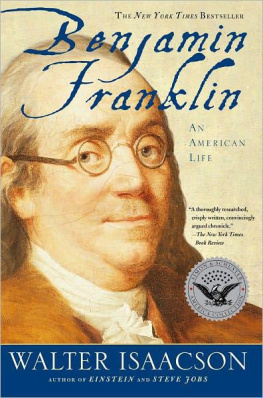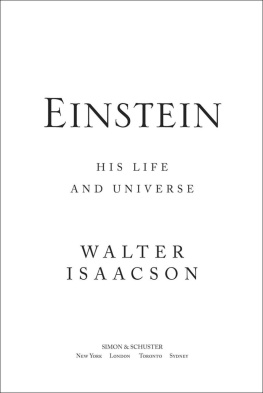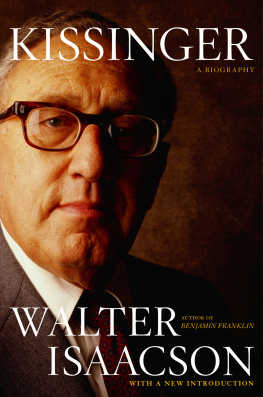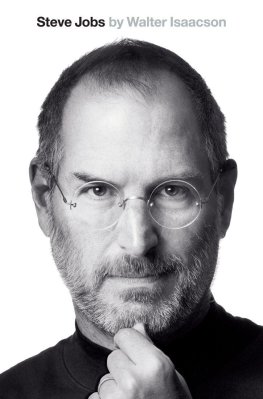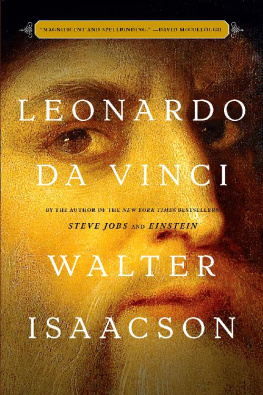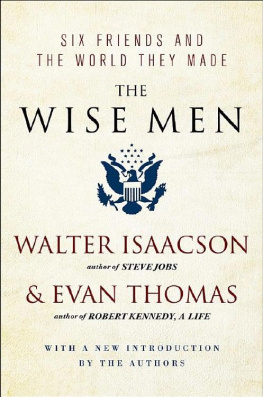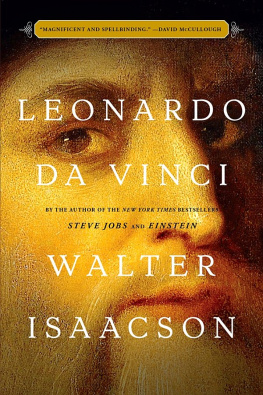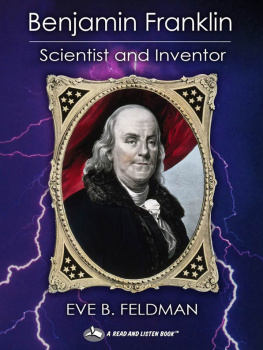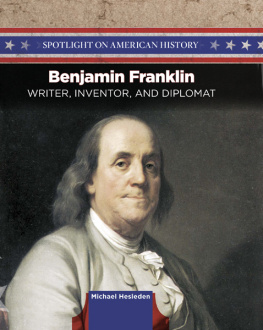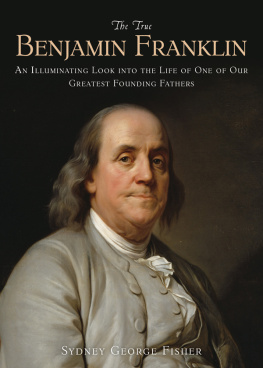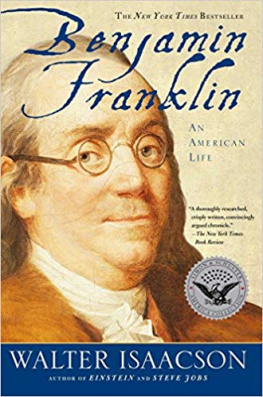SIMON AND SCHUSTER and colophon are registered trademarks of Simon & Schuster, Inc.
Library of Congress Cataloging-in-Publication Data Isaacson, Walter.
Benjamin Franklin and the invention of America : an American life / Walter Isaacson.
p. cm.
Includes bibliographical references and index.
1. Franklin, Benjamin, 17061790. 2. StatesmenUnited StatesBiography. 3. United StatesPolitics and government17751783. 4. United StatesPolitics and government17831789. 5. ScientistsUnited StatesBiography. 6. InventorsUnited StatesBiography. 7. PrintersUnited StatesBiography.
I. Title.
Chapter One
Benjamin Franklin
and the Invention
of America
His arrival in Philadelphia is one of the most famous scenes in autobiographical literature: the bedraggled 17-year-old runaway, cheeky yet with a pretense of humility, straggling off the boat and buying three puffy rolls as he wanders up Market Street. But wait a minute. Theres something more. Peel back a layer and we can see him as a 65-year-old wry observer, sitting in an English country house, writing this scene, pretending its part of a letter to his son, an illegitimate son who has become a royal governor with aristocratic pretensions and needs to be reminded of his humble roots.
A careful look at the manuscript peels back yet another layer. Inserted into the sentence about his pilgrims progress up Market Street is a phrase, written in the margin, in which he notes that he passed by the house of his future wife, Deborah Read, and that she, standing at the door, saw me and thought I made, as I certainly did, a most awkward ridiculous appearance. So here we have, in a brief paragraph, the multilayered character known so fondly to his author as Benjamin Franklin: as a young man, then seen through the eyes of his older self, and then through the memories later recounted by his wife. Its all topped off with the old mans deft little affirmationas I certainly didin which his self-deprecation barely cloaks the pride he felt regarding his remarkable rise in the world.
Benjamin Franklin is the founding father who winks at us. George Washingtons colleagues found it hard to imagine touching the austere general on the shoulder, and we would find it even more so today. Jefferson and Adams are just as intimidating. But Ben Franklin, that ambitious urban entrepreneur, seems made of flesh rather than of marble, addressable by nickname, and he turns to us from historys stage with eyes that twinkle from behind those newfangled spectacles. He speaks to us, through his letters and hoaxes and autobiography, not with oro-tund rhetoric but with a chattiness and clever irony that is very contemporary, sometimes unnervingly so. We see his reflection in our own time.
He was, during his eighty-four-year-long life, Americas best scientist, inventor, diplomat, writer, and business strategist, and he was also one of its most practical, though not most profound, political thinkers. He proved by flying a kite that lightning was electricity, and he invented a rod to tame it. He devised bifocal glasses and clean-burning stoves, charts of the Gulf Stream and theories about the contagious nature of the common cold. He launched various civic improvement schemes, such as a lending library, college, volunteer fire corps, insurance association, and matching grant fund-raiser. He helped invent Americas unique style of homespun humor and philosophical pragmatism. In foreign policy, he created an approach that wove together idealism with balance-of-power realism. And in politics, he proposed seminal plans for uniting the colonies and creating a federal model for a national government.
But the most interesting thing that Franklin invented, and continually reinvented, was himself. Americas first great publicist, he was, in his life and in his writings, consciously trying to create a new American archetype. In the process, he carefully crafted his own persona, portrayed it in public, and polished it for posterity.
Partly, it was a matter of image. As a young printer in Philadelphia, he carted rolls of paper through the streets to give the appearance of being industrious. As an old diplomat in France, he wore a fur cap to portray the role of backwoods sage. In between, he created an image for himself as a simple yet striving tradesman, assiduously honing the virtuesdiligence, frugality, honestyof a good shopkeeper and beneficent member of his community.
But the image he created was rooted in reality. Born and bred a member of the leather-aproned class, Franklin was, at least for most of his life, more comfortable with artisans and thinkers than with the established elite, and he was allergic to the pomp and perks of a hereditary aristocracy. Throughout his life he would refer to himself as B. Franklin, printer.
From these attitudes sprang what may be Franklins most important vision: an American national identity based on the virtues and values of its middle class. Instinctively more comfortable with democracy than were some of his fellow founders, and devoid of the snobbery that later critics would feel toward his own shopkeeping values, he had faith in the wisdom of the common man and felt that a new nation would draw its strength from what he called the middling people. Through his self-improvement tips for cultivating personal virtues and his civic-improvement schemes for furthering the common good, he helped to create, and to celebrate, a new ruling class of ordinary citizens.
The complex interplay among various facets of Franklins characterhis ingenuity and unreflective wisdom, his Protestant ethic divorced from dogma, the principles he held firm and those he was willing to compromisemeans that each new look at him reflects and refracts the nations changing values. He has been vilified in romantic periods and lionized in entrepreneurial ones. Each era appraises him anew, and in doing so reveals some assessments of itself.
Franklin has a particular resonance in twenty-first-century America. A successful publisher and consummate networker with an inventive curiosity, he would have felt right at home in the information revolution, and his unabashed striving to be part of an upwardly mobile meritocracy made him, in social critic David Brookss phrase, our founding Yuppie. We can easily imagine having a beer with him after work, showing him how to use the latest digital device, sharing the business plan for a new venture, and discussing the most recent political scandals or policy ideas. He would laugh at the latest joke about a priest and a rabbi, or about a farmers daughter. We would admire both his earnestness and his self-aware irony. And we would relate to the way he tried to balance, sometimes uneasily, the pursuit of reputation, wealth, earthly virtues, and spiritual values.

